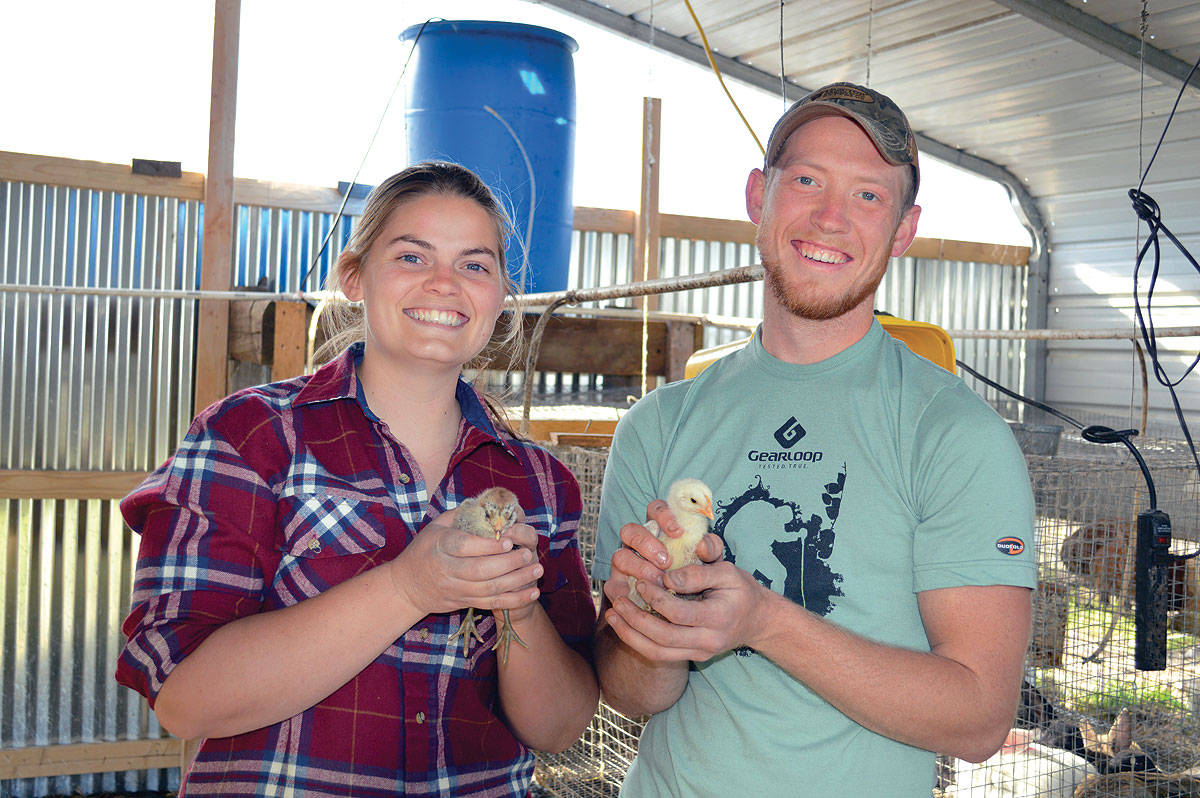When the owners of Green Thicket Farm talk about their farming strategies, they emphasize their use of Excel spreadsheets for budgeting, social media for marketing and YouTube for farming tutorials. There is no doubt – this is a farm run by Millennials.
Caleb and Klaire Howerton are a part of a new generation of farmers, who are working hard to carve out a unique farming path.
“You have to be able to offer people some things that are new and exciting, and interesting, but also things that everyone knows how to cook,” Klaire explained.
After trying to operate from their large backyard in the city, the Howertons purchased a home and six acres just north of Springfield, Mo., in August 2016.
“I wanted to start farming right away,” Caleb said. “I was like, I can’t do this. I can’t live in town.”
It was then that Green Thicket Farm took off and Caleb and Klaire started living their dream of owning and operating a farm.
“We thought, ‘What livestock can we do on a small footprint and do it efficiently and still meet with our ethical desires?’” Caleb said. The couple decided to raise rabbits, chickens, pigs, sheep and quail.
The Howertons don’t look to years of traditional farming tactics as their guide. Instead, they rely on new, innovative solutions for their small, diversified farm. They implemented rotational grazing for their livestock and intensive planting in their gardens.
The couple, who married three years ago, broadened their course work in college to include knowledge that would help them run a successful farm.
“I think one thing we are seeing with a lot of Millennial farmers is they are treating the farm as a business,” Caleb stated. “I took an accounting class in college for fun because I knew just as well as I needed welding, I needed accounting.”
Klaire uses the information she gleaned from her college computer courses in order to manage Green Thicket Farm’s networking and marketing plans.
“I learned things like how to create a website that looks nice and is functional and how much information you can put in an email newsletter,” Klaire explained. “Things like that have really, really helped.”
Green Thicket Farm sells its products primarily to local restaurants. Caleb honed his cooking skills through college culinary courses. His subsequent work with area chefs helped him develop a sense for what restaurants want from farmers.
“That has been one of our leading factors to making the farm successful – the culinary experience,” Caleb added. “I know where that product is going. I know what is going to be put into it so I know this is going to be really good to market to a chef.”
The two currently work jobs off the farm, but Caleb plans to start working full-time on the farm this spring. That’s when the couple plans to launch its Omnivore Community Supported Agriculture program.
Through Omnivore CSA, customers can pay monthly to receive weekly packages that include Green Thicket Farm meat, eggs and vegetables. “When we start the CSA program we want to do a really good job of giving people food they are comfortable with but also include some surprise items,” Klaire explained.
In addition, the Howertons host monthly farm to table dinners at their farm to showcase their products and educate their customers about farming. They also include recipes with the products they sell to individuals.
Currently, Green Thicket Farm raises three breeds of meat rabbits, New Zealand Red, New Zealand White and Californians. The Howertons own 15 breeding does and three bucks. Their goal is to breed three does a week in order to have a least one litter per week. They wean the kits at 4 to 6 weeks old and process them at 8 to 12 weeks old.
The couple has found it to be imperative to breed for good rabbit mothers. They use a three step criteria to select breeding does. First, they look at the rabbit’s size at weaning. If it is the largest in the litter, it may be kept for breeding. Secondly, they check how many kits are born in a litter. Lastly, the Howertons consider the number of kits that are weaned.
In addition to rabbits, Green Thicket Farm raises Cornish-cross chickens for meat and Production Red chickens for eggs. The Howertons also have jumbo Coturnix quail that are used for egg production and meat. The farm is further diversified with Duroc/Berkshire cross pigs and Katahdin sheep.
Caleb and Klaire approach farming with loads of exuberance, passion and fire.
“From the moment we met each other we knew we wanted to farm,” Caleb said.
And in just a few years, these Millennial farmers have made their dream come true.








